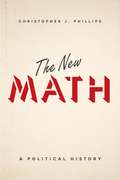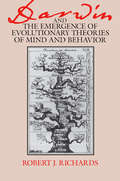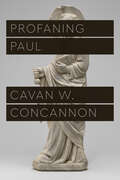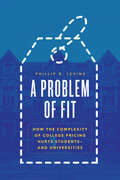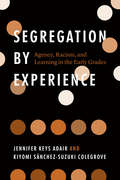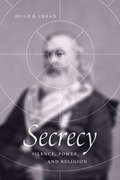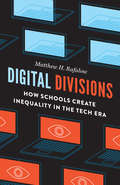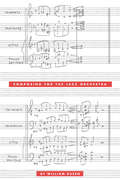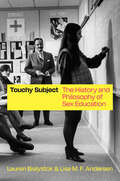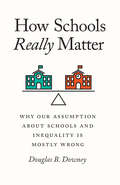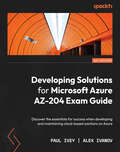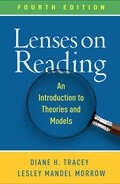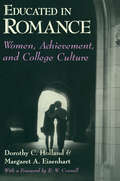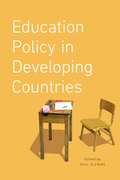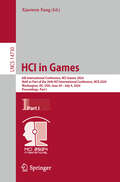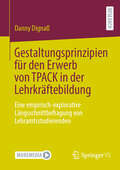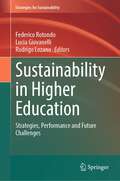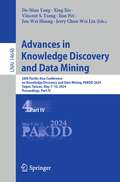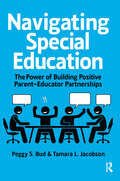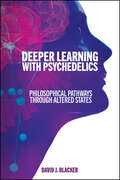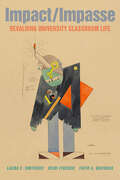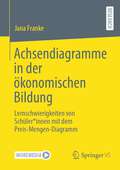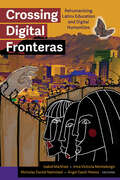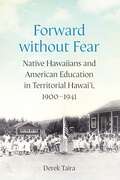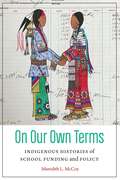- Table View
- List View
The New Math: A Political History
by Christopher J. PhillipsAn era of sweeping cultural change in America, the postwar years saw the rise of beatniks and hippies, the birth of feminism, and the release of the first video game. It was also the era of new math. Introduced to US schools in the late 1950s and 1960s, the new math was a curricular answer to Cold War fears of American intellectual inadequacy. In the age of Sputnik and increasingly sophisticated technological systems and machines, math class came to be viewed as a crucial component of the education of intelligent, virtuous citizens who would be able to compete on a global scale. In this history, Christopher J. Phillips examines the rise and fall of the new math as a marker of the period’s political and social ferment. Neither the new math curriculum designers nor its diverse legions of supporters concentrated on whether the new math would improve students’ calculation ability. Rather, they felt the new math would train children to think in the right way, instilling in students a set of mental habits that might better prepare them to be citizens of modern society—a world of complex challenges, rapid technological change, and unforeseeable futures. While Phillips grounds his argument in shifting perceptions of intellectual discipline and the underlying nature of mathematical knowledge, he also touches on long-standing debates over the place and relevance of mathematics in liberal education. And in so doing, he explores the essence of what it means to be an intelligent American—by the numbers.
Darwin and the Emergence of Evolutionary Theories of Mind and Behavior (Science And Its Conceptual Foundations Ser.)
by Robert J. RichardsWith insight and wit, Robert J. Richards focuses on the development of evolutionary theories of mind and behavior from their first distinct appearance in the eighteenth century to their controversial state today. Particularly important in the nineteenth century were Charles Darwin's ideas about instinct, reason, and morality, which Richards considers against the background of Darwin's personality, training, scientific and cultural concerns, and intellectual community. Many critics have argued that the Darwinian revolution stripped nature of moral purpose and ethically neutered the human animal. Richards contends, however, that Darwin, Herbert Spencer, and their disciples attempted to reanimate moral life, believing that the evolutionary process gave heart to unselfish, altruistic behavior. "Richards's book is now the obvious introduction to the history of ideas about mind and behavior in the nineteenth century."—Mark Ridley, Times Literary Supplement "Not since the publication of Michael Ghiselin's The Triumph of the Darwinian Method has there been such an ambitious, challenging, and methodologically self-conscious interpretation of the rise and development and evolutionary theories and Darwin's role therein."—John C. Greene, Science "His book . . . triumphantly achieves the goal of all great scholarship: it not only informs us, but shows us why becoming thus informed is essential to understanding our own issues and projects."—Daniel C. Dennett, Philosophy of Science
Profaning Paul (Class 200: New Studies in Religion)
by Cavan W. ConcannonA critical reconsideration of the repeated use of the biblical letters of Paul. The letters of Paul have been used to support and condone a host of evils over the span of more than two millennia: racism, slavery, imperialism, misogyny, and anti-Semitism, to name a few. Despite, or in some cases because of, this history, readers of Paul have felt compelled to reappropriate his letters to fit liberal or radical politics, seeking to set right the evils done in Paul’s name. Starting with the language of excrement, refuse, and waste in Paul’s letters, Profaning Paul looks at how Paul’s “shit” is recycled and reconfigured. It asks why readers, from liberal Christians to academic biblical scholars to political theorists and philosophers, feel compelled to make Paul into a hero, mining his words for wisdom. Following the lead of feminist, queer, and minoritized scholarship, Profaning Paul asks what would happen if we stopped recycling Paul’s writings. By profaning the status of his letters as sacred texts, we might open up new avenues for imagining political figurations to meet our current and coming political, economic, and ecological challenges.
A Problem of Fit: How the Complexity of College Pricing Hurts Students—and Universities
by Phillip B. LevineA critical examination of the complex system of college pricing—how it works, how it fails, and how fixing it can help both students and universities. How much does it cost to attend college in the United States today? The answer is more complex than many realize. College websites advertise a sticker price, but uncovering the actual price—the one after incorporating financial aid—can be difficult for students and families. This inherent uncertainty leads some students to forgo applying to colleges that would be the best fit for them, or even not attend college at all. The result is that millions of promising young people may lose out on one of society’s greatest opportunities for social mobility. Colleges suffer too, losing prospective students and seeing lower enrollments and less socioeconomic diversity. If markets require prices to function well, then the American higher-education system—rife as it is with ambiguity in its pricing—amounts to a market failure. In A Problem of Fit, economist Phillip B. Levine explains why institutions charge the prices they do and discusses the role of financial aid systems in facilitating—and discouraging—access to college. Affordability issues are real, but price transparency is also part of the problem. As Levine makes clear, our conversations around affordability and free tuition miss a larger truth: that the opacity of our current college-financing systems is a primary driver of inequities in education and society. In a clear-eyed assessment of educational access and aid in a post-COVID-19 economy, A Problem of Fit offers a trenchant new argument for educational reforms that are well within reach.
Segregation by Experience: Agency, Racism, and Learning in the Early Grades
by Jennifer Keys Adair Kiyomi Sánchez-Suzuki ColegroveEarly childhood can be a time of rich discovery, a period when educators have an opportunity to harness their students’ fascination to create unique learning opportunities. Some teachers engage with their students’ ideas in ways that make learning collaborative--but not all students have access to these kinds of learning environments. In Segregation by Experience, the authors filmed and studied a a first-grade classroom led by a Black immigrant teacher who encouraged her diverse group of students to exercise their agency. When the researchers showed the film to other schools, everyone struggled. Educators admired the teacher but didn’t think her practices would work with their own Black and brown students. Parents of color—many of them immigrants—liked many of the practices, but worried that they would compromise their children. And the young children who viewed the film thought that the kids in the film were terrible, loud, and badly behaved; they told the authors that learning was supposed to be quiet, still, and obedient. In Segregation by Experience Jennifer Keys Adair and Kiyomi Sánchez-Suzuki Colegrove show us just how much our expectations of children of color affect what and how they learn at school, and they ask us to consider which children get to have sophisticated, dynamic learning experiences at school and which children are denied such experiences because of our continued racist assumptions about them.
Secrecy: Silence, Power, and Religion (Routledge Handbooks In Religion Ser.)
by Hugh B. UrbanThe powers of political secrecy and social spectacle have been taken to surreal extremes recently. Witness the twin terrors of a president who refuses to disclose dealings with foreign powers while the private data of ordinary citizens is stolen and marketed in order to manipulate consumer preferences and voting outcomes. We have become accustomed to thinking about secrecy in political terms and personal privacy terms. In this bracing, new work, Hugh Urban wants us to focus these same powers of observation on the role of secrecy in religion. With Secrecy, Urban investigates several revealing instances of the power of secrecy in religion, including nineteenth-century Scottish Rite Freemasonry, the sexual magic of a Russian-born Parisian mystic; the white supremacist BrüderSchweigen or “Silent Brotherhood” movement of the 1980s, the Five Percenters, and the Church of Scientology. An electrifying read, Secrecy is the culmination of decades of Urban’s reflections on a vexed, ever-present subject.
Digital Divisions: How Schools Create Inequality in the Tech Era
by Matthew H. RafalowIn the digital age, schools are a central part of a nationwide effort to make access to technology more equitable, so that all young people, regardless of identity or background, have the opportunity to engage with the technologies that are essential to modern life. Most students, however, come to school with digital knowledge they’ve already acquired from the range of activities they participate in with peers online. Yet, teachers, as Matthew H. Rafalow reveals in Digital Divisions, interpret these technological skills very differently based on the race and class of their student body. While teachers praise affluent White students for being “innovative” when they bring preexisting and sometimes disruptive tech skills into their classrooms, less affluent students of color do not receive such recognition for the same behavior. Digital skills exhibited by middle class, Asian American students render them “hackers,” while the creative digital skills of working-class, Latinx students are either ignored or earn them labels troublemakers. Rafalow finds in his study of three California middle schools that students of all backgrounds use digital technology with sophistication and creativity, but only the teachers in the school serving predominantly White, affluent students help translate the digital skills students develop through their digital play into educational capital. Digital Divisions provides an in-depth look at how teachers operate as gatekeepers for students’ potential, reacting differently according to the race and class of their student body. As a result, Rafalow shows us that the digital divide is much more than a matter of access: it’s about how schools perceive the value of digital technology and then use them day-to-day.
Composing for the Jazz Orchestra
by William Russo"Although it will be of primary interest to those who are engaged in composition themselves, [this] book is also recommended for readers who may wish to gain further insight into just what makes jazz composition so different from traditional approaches."—Malcolm Bessom, The Music Magazine
Touchy Subject: The History and Philosophy of Sex Education (History And Philosophy Of Education Ser.)
by Lauren Bialystok Lisa M.F. AndersenA case for sex education that puts it in historical and philosophical context. In the United States, sex education is more than just an uncomfortable rite of passage: it's a political hobby horse that is increasingly out of touch with young people’s needs. In Touchy Subject, philosopher Lauren Bialystok and historian Lisa M. F. Andersen unpack debates over sex education, explaining why it’s worth fighting for, what points of consensus we can build upon, and what sort of sex education schools should pursue in the future. Andersen surveys the history of school-based sex education in the United States, describing the key question driving reform in each era. In turn, Bialystok analyzes the controversies over sex education to make sense of the arguments and offer advice about how to make educational choices today. Together, Bialystok and Andersen argue for a novel framework, Democratic Humanistic Sexuality Education, which exceeds the current conception of “comprehensive sex education” while making room for contextual variation. More than giving an honest run-down of the birds and the bees, sex education should respond to the features of young people’s evolving worlds, especially the digital world, and the inequities that put some students at much higher risk of sexual harm than others. Throughout the book, the authors show how sex education has progressed and how the very concept of “progress” remains contestable.
How Schools Really Matter: Why Our Assumption about Schools and Inequality Is Mostly Wrong
by Douglas B. DowneyMost of us assume that public schools in America are unequal—that the quality of the education varies with the location of the school and that as a result, children learn more in the schools that serve mostly rich, white kids than in the schools serving mostly poor, black kids. But it turns out that this common assumption is misplaced. As Douglas B. Downey shows in How Schools Really Matter, achievement gaps have very little to do with what goes on in our schools. Not only do schools not exacerbate inequality in skills, they actually help to level the playing field. The real sources of achievement gaps are elsewhere. A close look at the testing data in seasonal patterns bears this out. It turns out that achievement gaps in reading skills between high- and low-income children are nearly entirely formed prior to kindergarten, and schools do more to reduce them than increase them. And when gaps do increase, they tend to do so during summers, not during school periods. So why do both liberal and conservative politicians strongly advocate for school reform, arguing that the poor quality of schools serving disadvantaged children is an important contributor to inequality? It’s because discussing the broader social and economic reforms necessary for really reducing inequality has become too challenging and polarizing—it’s just easier to talk about fixing schools. Of course, there are differences that schools can make, and Downey outlines the kinds of reforms that make sense given what we know about inequality outside of schools, including more school exposure, increased standardization, and better and fairer school and teacher measurements. ?How Schools Really Matter offers a firm rebuke to those who find nothing but fault in our schools, which are doing a much better than job than we give them credit for. It should also be a call to arms for educators and policymakers: the bottom line is that if we are serious about reducing inequality, we are going to have to fight some battles that are bigger than school reform—battles against the social inequality that is reflected within, rather than generated by—our public school system.
Developing Solutions for Microsoft Azure AZ-204 Exam Guide: Discover the essentials for success when developing and maintaining cloud-based solutions on Azure
by Paul Ivey Alex IvanovBuild a thorough understanding of the technology, concepts, and development patterns used in building applications in Azure, through detailed explanations, hands-on exercises, and downloadable code samplesKey FeaturesWritten by two Microsoft technical trainers to help you explore the exam topics in a structured wayUnderstand the “why”, and not just “how” behind design and solution decisionsFollow along examples with downloadable code samples to help cement each topic's learning objectiveBook DescriptionWith the prevalence of cloud technologies and DevOps ways of working, the industry demands developers who can build cloud solutions and monitor them throughout their life cycle. Becoming a Microsoft-certified Azure developer can differentiate developers from the competition, but with such a plethora of information available, it can be difficult to structure learning in an effective way to obtain certification. Through easy-to-understand explanations and exercises, this book will provide a more palatable learning experience than what you may expect from an exam preparation book. You'll start off with a recap of some important cloud concepts, such as IaaS, PaaS, and SaaS. From there, you'll learn about each relevant solution area, with use cases. The chapters also cover different implementation methodologies, both manual and programmatic – ranging from compute resources such as App Service and serverless applications to storage, database, security, monitoring solutions, and connecting to third-party services. By the end of this book, you'll have learned everything you need to pass the AZ-204 certification exam and have a handy, on-the-job reference guide.What you will learnDevelop Azure compute solutionsDiscover tips and tricks from Azure experts for interactive learningUse Cosmos DB storage and blob storage for developing solutionsDevelop secure cloud solutions for AzureUse optimization, monitoring, and troubleshooting for Azure solutionsDevelop Azure solutions connected to third-party servicesWho this book is forThis book is for Azure developers looking to improve their Azure development knowledge to pass the AZ-204 exam. This book assumes at least one year of professional development experience with Azure, with the ability to program in at least one language supported by Azure. Existing Azure CLI and PowerShell skills will also be useful.
Lenses on Reading: An Introduction to Theories and Models
by Diane H. Tracey Lesley Mandel MorrowNow in a revised and updated fourth edition incorporating current advances in research and instructional practices, this well-established text accessibly introduces prominent theories and models related to reading. The book is organized chronologically, from classical approaches to contemporary cognitive, social learning, physiological, and affective perspectives. It emphasizes that the more lenses educators possess for examining reading processes, the better equipped they will be to understand and facilitate children's literacy development. Pedagogical features include framing and discussion questions, learning activities, teacher anecdotes, and examples of how each model is applied in classroom practice and research. New to This Edition *Chapter on digital literacy. *Expanded discussions of direct/explicit instruction, social and emotional learning, critical literacy theory, critical race theory, culturally responsive teaching, social equity and justice, the science of reading, and neuroscientific lenses. *All chapters updated with the latest research; many new classroom anecdotes added. *Links to recommended YouTube videos illustrating the theories and models.
Educated in Romance: Women, Achievement, and College Culture
by Dorothy C. Holland Margaret A. EisenhartIs romance more important to women in college than grades are? Why do so many women enter college with strong academic backgrounds and firm career goals but leave with dramatically scaled-down ambitions? Dorothy C. Holland and Margaret A. Eisenhart expose a pervasive "culture of romance" on campus: a high-pressure peer system that propels women into a world where their attractiveness to men counts most.
Education Policy in Developing Countries
by Paul GlewweAlmost any economist will agree that education plays a key role in determining a country’s economic growth and standard of living, but what we know about education policy in developing countries is remarkably incomplete and scattered over decades and across publications. Education Policy in Developing Countries rights this wrong, taking stock of twenty years of research to assess what we actually know—and what we still need to learn—about effective education policy in the places that need it the most. Surveying many aspects of education—from administrative structures to the availability of health care to parent and student incentives—the contributors synthesize an impressive diversity of data, paying special attention to the gross imbalances in educational achievement that still exist between developed and developing countries. They draw out clear implications for governmental policy at a variety of levels, conscious of economic realities such as budget constraints, and point to crucial areas where future research is needed. Offering a wealth of insights into one of the best investments a nation can make, Education Policy in Developing Countries is an essential contribution to this most urgent field.
HCI in Games: 6th International Conference, HCI-Games 2024, Held as Part of the 26th HCI International Conference, HCII 2024, Washington, DC, USA, June 29–July 4, 2024, Proceedings, Part I (Lecture Notes in Computer Science #14730)
by Xiaowen FangThis book constitutes the refereed proceedings of the 6th International Conference on HCI in Games, held as part of the 26th International Conference, HCI International 2024, which took place in Washington DC, USA, during June 29 - July 4, 2024. The total of 1271 papers and 309 posters included in the HCII 2024 proceedings was carefully reviewed and selected from 5108 submissions. The two volume set of HCI-Games 2024 proceedings were organized in the following topical sections: Volume 14730: Part I: Game Design and Gamification; Part II: Game-based Learning; Part III: Games and Artificial Intelligence Volume 14731: Part I: Advancing Education Through Serious Games; Part II: Player Experience and Engagement
Gestaltungsprinzipien für den Erwerb von TPACK in der Lehrkräftebildung: Eine empirisch-explorative Längsschnittbefragung von Lehramtsstudierenden
by Danny DignaßDie voranschreitende Digitalisierung unserer Lebenswelt stellt die traditionelle Lehrkräfteausbildung in Deutschland vor die Herausforderung, sich den Veränderungen anzupassen und den steigenden Anforderungen im Umgang mit digitalen Medien gerecht zu werden. Dieses Buch konzentriert sich auf die Entwicklung und Förderung von digitalisierungsbezogenen Kompetenzen und Einstellungen sowie der unterrichtlichen Nutzungshäufigkeit digitaler Medien bei Lehramtsstudierenden. Am konkreten Beispiel der Technischen Universität Dortmund werden dabei Zusammenhänge zwischen spezifischen Gestaltungsprinzipien digitalisierungsbezogener Lehr-Lernangebote für angehende Lehrkräfte und dem TPACK-Konzept erforscht. Die Untersuchung basiert auf einer umfassenden Auswertung quantitativer und qualitativer Daten aus den Sommersemestern 2021 und 2023. Im Zentrum dieser Arbeit steht die Bereitstellung einer evidenzbasierten Orientierung für die Vorbereitung von Lehramtsstudierenden auf einen effektiven Einsatz digitaler Medien in schulischen Lehr-Lernprozessen in der Digitalität.
Sustainability in Higher Education: Strategies, Performance and Future Challenges (Strategies for Sustainability)
by Rodrigo Lozano Federico Rotondo Lucia GiovanelliThis contributed volume addresses the issue of how higher education institutions can systematically reorient themselves to help society become more sustainable. In particular, a strategic management approach is used to overcome the fragmentation of sustainability initiatives increasingly conducted by higher education institutions worldwide. In this book, eminent scholars in the field of sustainability in higher education combine their different backgrounds to propose conceptual frameworks for interpreting and measuring sustainability integration in higher education institutions. The chapters contained herein explore which processes and management tools should be used, as well the challenges to be faced, to make sustainable innovation effective. The cases present in this volume offer a guide for higher education institution management to lead the sustainability transition.
Advances in Knowledge Discovery and Data Mining: 28th Pacific-Asia Conference on Knowledge Discovery and Data Mining, PAKDD 2024, Taipei, Taiwan, May 7–10, 2024, Proceedings, Part IV (Lecture Notes in Computer Science #14648)
by Vincent S. Tseng Jerry Chun-Wei Lin Xing Xie Jian Pei De-Nian Yang Jen-Wei HuangThe 6-volume set LNAI 14645-14650 constitutes the proceedings of the 28th Pacific-Asia Conference on Knowledge Discovery and Data Mining, PAKDD 2024, which took place in Taipei, Taiwan, during May 7–10, 2024. The 177 papers presented in these proceedings were carefully reviewed and selected from 720 submissions. They deal with new ideas, original research results, and practical development experiences from all KDD related areas, including data mining, data warehousing, machine learning, artificial intelligence, databases, statistics, knowledge engineering, big data technologies, and foundations.
Navigating Special Education: The Power of Building Positive Parent-Educator Partnerships
by Peggy Bud Tamara JacobsonThis timely and innovative roadmap for parents, educators, and administrators highlights the importance of effective communication methodology, appropriate correspondence, and data collection recommendations. Effective communication is often missing from the IEP team’s conversation. Navigating Special Education provides a foundation for building proactive, positive partnerships that will lead to 21st century best practices for children.The 5-C Model of Communication—Conversation, Collaboration, Cooperation, Compromise, and Consensus—presented in Navigating Special Education helps to forge trusted alliances between school districts and families.Navigating Special Education draws upon the authors’ 60-plus years of combined experience by using: Anecdotal, evidence-based, real-life scenarios Templates for letter writing and extensive data collection A user-friendly appendix and glossary As stakeholders, wouldn’t you like to have successful meetings where everyone’s voice is heard, respected, and understood? After reading Navigating Special Education, families, educational professionals, college students, and special education organizations will be able to implement effective models of communication and build positive partnerships.
Deeper Learning with Psychedelics: Philosophical Pathways through Altered States (SUNY series, Horizons in the Philosophy of Education)
by David J. BlackerIn both clinical and informal settings, psychedelics users often report they have undergone something profound and even life-altering. Yet there persists a confounding inability to articulate just what has been imparted. Informed by multidisciplinary emerging research, this book provides an account of the specifically educational aspects of psychedelics and how they can render us ready to learn. Drawing from indigenous peoples worldwide who typically revere these substances as "plant teachers" and from canonical thinkers in the western tradition such as Plato, Spinoza, Kant, and Heidegger, the author proposes an original set of categories through which to understand the educational capabilities of "entheogens" (psychedelics with visionary qualities). It emerges that entheogens' real power lies not in destabilizing and decentering—"turning on and dropping out"—but as powerful aids in restoring and reenchanting our shared worlds.
Impact/Impasse: Revaluing University Classroom Life
by Laura E. Smithers Heidi Fischer Faith A. WatrousImpact/Impasse argues for the value of everyday life in college classrooms. Quantifiable categories such as high-impact practice, student engagement, and integrative learning have captured the imagination of a generation of higher education researchers, practitioners, administrators, and policymakers. But they miss those mundane moments, or "impasses," that resist capture by metrics while nevertheless shaping student outcomes. Impact/Impasse blends critical theories and ethnographic research—conducted before and during the COVID-19 pandemic—to argue that learning happens in ordinary moments. Indeed, in sharing anecdotes from both in-person and virtual classrooms, the coauthors show how the so-called new normal is little different from the old in its neoliberal attachment to data. Impact/Impasse provides a conceptual and practical foundation for an alternative approach to valuing impacts on their own terms, in excess of quantification.
Achsendiagramme in der ökonomischen Bildung: Lernschwierigkeiten von Schüler*innen mit dem Preis-Mengen-Diagramm
by Jana FrankeÖkonomische Modelle werden durch bewusste Reduktion der Komplexität des Betrachteten mit dem Ziel des Erkenntnisgewinns entwickelt. Mithilfe von mathematischen Modellierungen können ökonomische Modelle exakter gefasst werden. Dieses Resultat ist ein wichtiges Werkzeug bei der Ermittlung und Darstellung von Systemzusammenhängen. Durch die Visualisierung der mathematischen Modellierungen mit dem Achsendiagramm werden abstrakte Zusammenhänge erkennbar und diskutierbar. Deshalb finden ökonomische Achsendiagramme in der Schule unter anderem als Hilfsmittel zur systematischen Betrachtung einzelner Einflussfaktoren eines komplexen Interaktionssystems, wie beispielsweise der Preisbildung auf Märkten, Einsatz. Die Visualisierung des ökonomischen Modells der Preisbildung auf Märkten mithilfe des Preis-Mengen-Diagramms kann dabei die ökonomischen Verständnisprozesse fördern, sie aber auch behindern. Inwieweit das Preis-Mengen-Diagramm somit Hilfsmittel und Hürde im Wirtschaftsunterricht darstellt, wird in diesem Buch untersucht. Dafür werden Lernschwierigkeiten von Schüler*innen beim Umgang mit und dem Wissen über die mathematische Modellierung des ökonomischen Modells der Preisbildung im vollkommenen Markt und dessen Visualisierung durch das Preis-Mengen-Diagramm identifiziert. Darauf aufbauend werden Implikationen für den Wirtschaftsunterricht abgeleitet.
Crossing Digital Fronteras: Rehumanizing Latinx Education and Digital Humanities
by Isabel Martinez Irma Victoria Montelongo Nicholas Daniel Natividad Ángel David NievesCrossing Digital Fronteras is about liberatory possibilities and digital technologies in the classroom. The book centers critical Latinx Digital Humanities to illustrate the ways college faculty and Latinx students harness digital tools to engage in "messy" yet essential active learning and knowledge production in Hispanic-Serving Institutions (HSIs) and Latinx Studies courses. With increasing Latinx student enrollment and a growing need for the humanities in our complex world, it is essential that HSIs and instructors integrate twenty-first-century tools into their teaching practices to truly "serve" Latinx students and communities. This book definitively inserts Latinx Digital Humanities into broader conversations about best practices at HSIs, on the one hand, and digital humanities and social justice, on the other. Most importantly, it provides practical examples of innovative, rehumanizing digital pedagogies that give students the liberatory learning they deserve.
Forward without Fear: Native Hawaiians and American Education in Territorial Hawai'i, 1900–1941 (Studies in Pacific Worlds)
by Derek TairaDuring Hawai&‘i&’s territorial period (1900–1959), Native Hawaiians resisted assimilation by refusing to replace Native culture, identity, and history with those of the United States. By actively participating in U.S. public schools, Hawaiians resisted the suppression of their language and culture, subjection to a foreign curriculum, and denial of their cultural heritage and history, which was critical for Hawai&‘i&’s political evolution within the manifest destiny of the United States. In Forward without Fear Derek Taira reveals that many Native Hawaiians in the first forty years of the territorial period neither subscribed nor succumbed to public schools&’ aggressive efforts to assimilate and Americanize them but instead engaged with American education to envision and support an alternate future, one in which they could exclude themselves from settler society to maintain their cultural distinctiveness and protect their Indigenous identity. Taira thus places great emphasis on how they would have understood their actions—as flexible and productive steps for securing their cultural sovereignty and safeguarding their future as Native Hawaiians—and reshapes historical understanding of this era as one solely focused on settler colonial domination, oppression, and elimination to a more balanced and optimistic narrative that identifies and highlights Indigenous endurance, resistance, and hopefulness.
On Our Own Terms: Indigenous Histories of School Funding and Policy (Indigenous Education)
by Meredith McCoyOn Our Own Terms contextualizes recent federal education legislation against the backdrop of two hundred years of education funding and policy to explore two critical themes: the racial and settler colonial dynamics that have shaped Indian education and an equally long and persistent tradition of Indigenous peoples engaging schools, funding, and policy on their own terms. Focusing primarily on the years 1819 to 2018, Meredith L. McCoy provides an interdisciplinary, methodologically expansive look into the ways federal Indian education policy has all too often been a tool for structural violence against Native peoples. Of particular note is a historical budget analysis that lays bare inconsistencies in federal support for Indian education and the ways funds become a tool for redefining educational priorities. McCoy shows some of the diverse strategies families, educators, and other community members have used to creatively navigate schooling on their own terms. These stories of strategic engagement with schools, funding, and policy embody what Gerald Vizenor has termed survivance, an insistence of Indigenous presence, trickster humor, and ironic engagement with settler structures. By gathering these stories together into an archive of survivance stories in education, McCoy invites readers to consider ongoing patterns of Indigenous resistance and the possibilities for bending federal systems toward community well-being.
